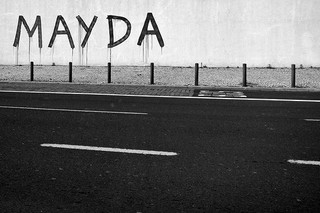The other Mayday is a distress call. It comes from the French “m’aidez,” or help me. When repeated three times on a radio frequency, Mayday signifies grave and imminent danger. If such a call had gone out May 2, 2011 — the night of the election of a majority Harper government — a significant number of Canadians would not have thought it a hoax.
Most of Europe celebrates the first day of May as Labour Day. In Canada, labour organizations also mark the event. The May 1 holiday celebrates workers: the doers, the enablers, the creators; people who work with their hands, their bodies, their heads to produce and re-produce the conditions of our existence. May 1 is a day for solidarity among working people.
The holiday has its origins in Celtic spring rituals. The workers’ day coincides with the return of light, and the sun’s warmth. Flowers bloom as the land is reborn each year. In Paris, people buy and wear a sprig of muguet (white lily).
As a labour event, May 1 is associated with the struggle for reductions in working time, the eight-hour day, and ending police repression of workers. Spring signifies the richness of the earth, and May 1 the collective riches workers produce on the job.
In Canada, a year after 24 per cent of eligible voters elected a Harper “majority” government, May 1 signals distress for public sector workers. The third set of layoff notices were sent out April 30 to six federal government departments. Federal government cutbacks, and austerity, add to cutbacks and austerity at the provincial and municipal government levels. The overall effect is negative for Canadian jobs, and incomes.
Private sector employers exploit workers, pay them less than what they produce. American Nobel prize-winning economists Joseph Stiglitz and Paul Krugman have become outspoken in their opposition to the prevailing economic order. America is a failure, Stiglitz told a European audience; people are worse off than they were 15 years ago. Productive work makes the U.S. more unequal, writes New York Times columnist Krugman on his blog, citing, approvingly, research from Larry Mishel of the Economic Policy Institute, showing how two-thirds of productivity gains go to the wealthy, not the workers.
The Harper government plans to admit more migrant workers, more quickly, so as to drive down private sector wages even further. It is making changes to Employment Insurance to make workers unable to refuse dead-end, poorly paid jobs.
The Harper regime is removing environmental protection, food inspection and regulation, and making other modifications to about 60 pieces of significant legislative statutes by transforming the budget into an omnibus bill that will not receive normal parliamentary scrutiny. Austerity, it turns out, is about reducing the ability of government to protect citizens from private sector abuses of power.
Louis Roy, the new president of the CSN, the Quebec-based trade union central thinks Quebec student associations have something to teach trade unionists looking for ways to renew the trade union movement. Like many in Quebec, Louis Roy favours zero tuition fees for post-secondary education, and he supports the students’ action to resist the 75 per cent hikes in tuition initially proposed by the Charest Quebec government, since raised to 82 per cent in its “offer” to negotiate.
Quebec students wear a square piece of red felt (carré rouge) to signify their opposition to further indebtedness implied by significant tuition increases. By defying the government, striking classes, and taking to the streets across the province, the students have captured the Quebec imagination.
The student strike is about much more than tuition fees. It represents a direct challenge to an unjust society where education and health care become commodities for sale and purchase. The call to end fees for services is a call for social solidarity, for public goods to be available on the basis of need, and for public investment in the common good.
The “distinct society” is being told by Premier Jean Charest to raise tuition fees to levels that prevail elsewhere in Canada. Canadians should respond by following the lead of Quebec students, and putting our society into question.
Last May 2, Quebecers elected 59 followers of Jack Layton, a one-time Quebec student who marched for McGill Français, and joined the NDP because it opposed the War Measures Act introduced by Pierre Trudeau. As public sector workers send out their calls of distress, the official opposition needs to inspire Canadians to demand governments provide more and better public services, and better salaries and living conditions for all Canadians.
Duncan Cameron is the president of rabble.ca and writes a weekly column on politics and current affairs.



